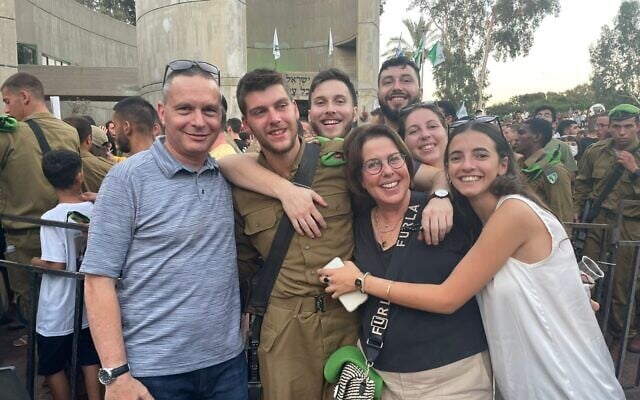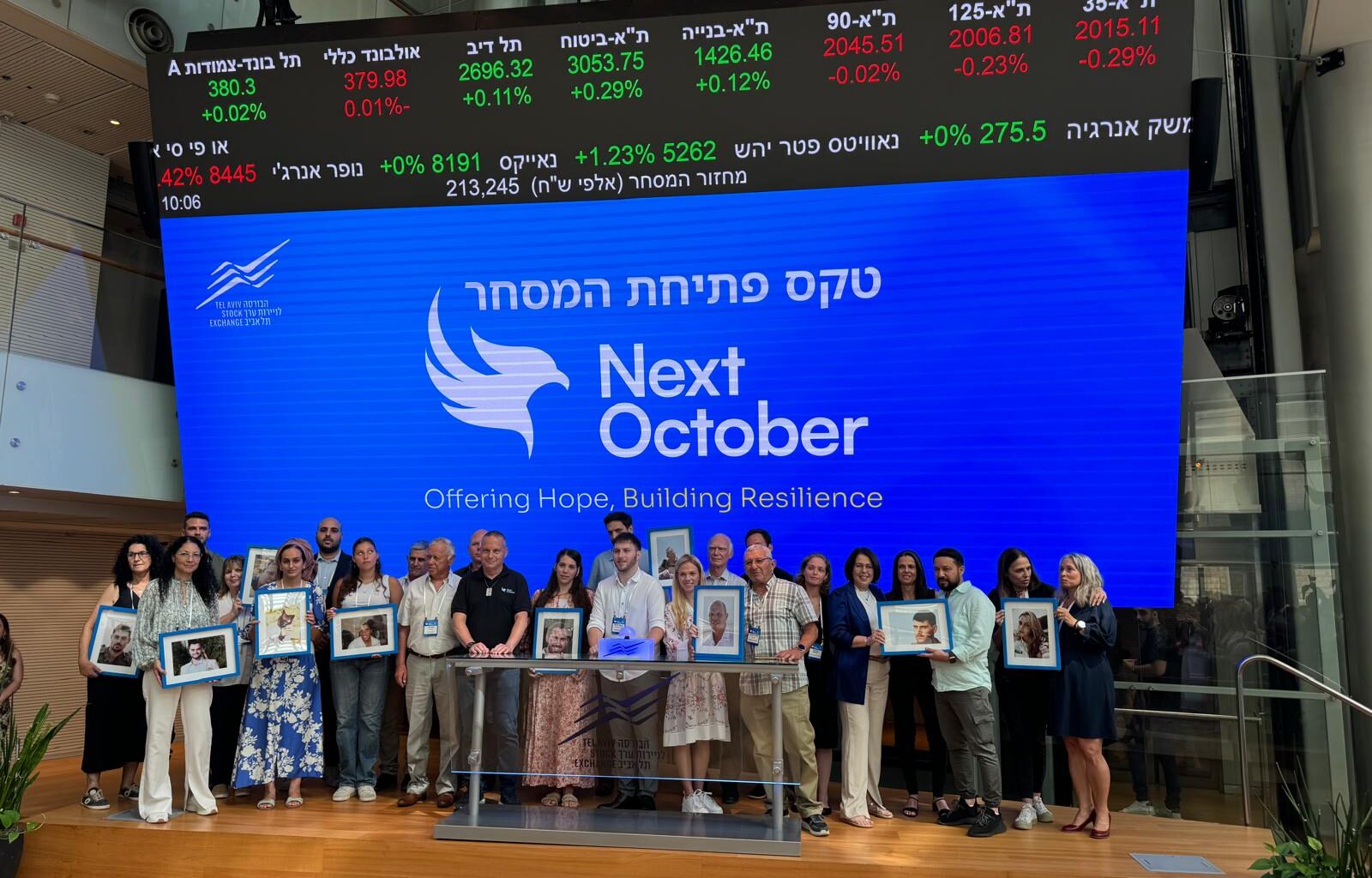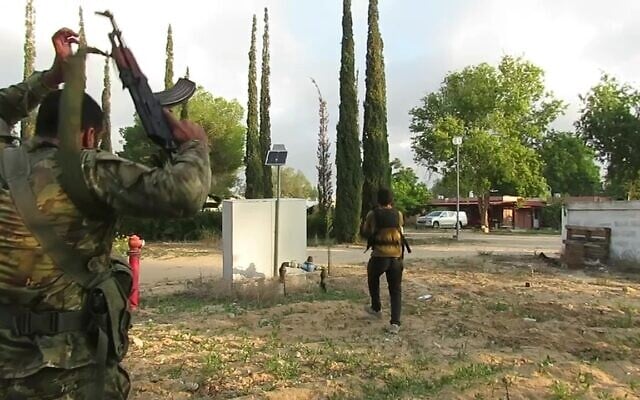During the darkest days of the shiva mourning period, as Izhar Shay grieved the death of his soldier son Yaron Oree Shay, who was killed while fighting Hamas terrorists on October 7, 2023, he also made a bold pledge to preserve the memory of all those lost in the invasion and subsequent war in Gaza.
Inspired to find a meaningful way to keep his child’s “special character” alive, the former science and technology minister and his family initiated an ambitious project to directly commemorate the spirit of Israel’s fallen and aid in rebuilding the war-battered economy.
The product, Next October, helps to fund and support early-stage businesses that agree to commemorate one of the approximately 2,000 people killed in the October 7 attack and the ensuing war, in perpetuity. In two years, the project has enlisted 450 startups, giving the companies a leg up while ensuring those lost are remembered in a variety of ways.
Some have done so by having employees volunteer in their adopted figure’s memory, or by sponsoring memorial events or fundraisers. One company named a product after their commemorated victim. Another added their name to the company’s advisory board on a pitch deck.
“There are 450 families that know that their dear ones’ memories are still alive because people in these startups engage in initiatives, programs, and projects to remember and commemorate them, carry their message, and their actions,” said Shay.
The project is one of hundreds started by bereaved families grappling with the sensitive question of how to commemorate their loved ones after the bloody Hamas-led assault on southern Israel, in which some 1,200 people were killed and entire communities ravaged. The two-year war sparked by the invasion also claimed hundreds of lives of IDF soldiers as well as civilians.
Speaking with The Times of Israel just days before the second anniversary of his son’s murder, Shay, a serial entrepreneur, said that he, together with his tech-focused wife Hila and Yaron’s three siblings, initially sought to respond to the October 7 atrocities by aiding a single new startup that would commemorate Yaron and integrate his stories and memories into the core of its venture.
Very quickly, though, the seasoned venture capitalist realized that the soul of the project wasn’t about bolstering just one startup in memory of Yaron, but about “creating and connecting to as many as needed to commemorate all the victims of this war, soldiers and civilians.”
“For every fallen soldier, for every baby killed, for every elderly person… for everyone who lost their life that day, we are going to build or support a great innovative startup that can change the world in many ways but also commemorate the lives of those victims,” Shay said. “A startup company will [connect with] the family of a victim to learn about who the person was, their aspirations, dreams, passions, and attributes.”
From a handful of people brainstorming in their backyard, Next October has grown to 90 volunteers and analysts, including many engaged in the delicate matchmaking process between a startup and a bereaved family.
Among the supporting partners that have joined the project are companies and venture capital firms including Meta, OurCrowd, Pitango, Silvertech Ventures, TLV Partners, and Ibex Investors.

Staff Sgt. Yaron Oree Shay, 21, who was killed on October 7 during fierce clashes with Hamas terrorists, hugs his father, former science and technology minister Izhar Shay. (Courtesy)
Companies that join the project are provided with mentorship and get help finding investors or business opportunities.
“Although Next October started from grief and pain and from our own personal story, the notion is to create hope and build a better world after October 7 by leveraging Israel’s famous attributes of resilience, optimism, and entrepreneurship,” said Shay.
“Next October faces not only inwards into Israel, but it is also a message to the world that after Hamas-led terrorists came to destroy and eliminate everything we stand for, we continue to go about our lives and about our businesses and are building a better world based on Israeli innovation.”
A native of Kibbutz Ein Hashlosha, one of several communities attacked on October 7, Shay had decades of experience in Israel’s tech ecosystem before entering the Knesset in 2019 with Benny Gantz’s Blue and White party. He served as science and technology minister from mid-2020 until his party quit the government in 2021, and he later left politics to return to the private sector.
On the morning of the deadly invasion, Yaron, 21, a combat soldier in the Israel Defense Forces’ Nahal Brigade, was one of three troops attempting to fight off terrorists who had infiltrated the Kibbutz Kerem Shalom area at the southernmost section of Israel’s border with the Gaza Strip.
Yaron was killed while defending the kibbutz, helping eliminate dozens of terrorists and repelling the attack. Heavy damage was caused to several homes in the Kibbutz Kerem Shalom community, but no residents were murdered or abducted to Gaza.
Shay recounted that the heroic actions of his beloved son, whom the family fondly called “Noni,” protected hundreds of people who owe their lives to his unit’s brave soldiers.
“The terrorists were planning to enter the kibbutz to rape, torture, burn, kill as many residents as they could, and kidnap people to Gaza,” said Shay. “The soldiers saved the lives of kids, babies, the elderly, and everyone who was in the kibbutz celebrating the Simhat Torah holiday.”
“Sadly, Yaron lost his life in that battle,” Shay said, describing his son as a charismatic leader and a witty character who was passionate about sports and music and played the piano for 12 years. Before joining the army, Yaron volunteered as a mentor for socially and economically challenged children in south Tel Aviv, Shay added.

Tech veteran Izhar Shay (left) next to his son Yaron Oree Shay (second from left), who was killed in the area of Kibbutz Kerem Shalom on October 7, 2023. (Courtesy)
Tel Aviv-based startup Pery, which developed an AI-based advice app for parents dealing with children diagnosed with attention deficit hyperactivity disorder, decided to honor Yaron, dedicating a section of its office to his memory by displaying photos and stories. Other efforts include organizing memorial events with the bereaved family and launching community-driven campaigns that reflect the values Yaron stood for.
“Last year, the startup’s employees went to the south of Tel Aviv to a community, helping children from economically challenged families, where Yaron had volunteered during his gap year before being drafted to the army,” said Shay. “Because Yaron was so passionate about music, they also distributed a playlist of his favorite songs on Spotify to their employees.”
Most of the companies taking part in the project are just starting up or going through early funding rounds. While Next October does not directly fund the startups in the project, it helps them in other ways, including linking them with investors key to supporting and influencing their journey.
“We are investing a lot of effort in helping those startups by mentoring them, by presenting them to investors, and providing business opportunities,” said Shay. “Each of these startups is a business by itself, which employs people, grows its footprint, develops and exports products, generates taxes, and other benefits that contribute to Israeli GDP.”
The prolonged wartime call-up of reserve soldiers, many of whom work in local tech firms, has been a challenge for Israel’s entire economy — particularly for early-stage startups, which have struggled to secure funding critical for their survival as well as maintain daily operations amid staffing shortages.
Each startup joining the initiative maintains its chosen name and commits to carrying the responsibility of keeping the memory of a fallen alive by remembrance initiatives and by communicating their stories to the world. Businesses are filtered, screened and selected according to the same criteria as any other startup in Israel, Shay added.
In Israel’s tech ecosystem, startups are the engine of future mergers and acquisitions, tax revenue and job creation. Tech workers contribute more than a third of all income tax collected, underscoring the sector’s central role in reviving an economy weighed down by two years of war.
Shay held up Israeli biotech startup Avertto as an example of a Next October success story.
Avertto decided to honor the legacy of 22-year-old paramedic Amit Mann, who was murdered by Hamas terrorists on October 7 when they stormed the clinic in Kibbutz Be’eri, where Mann was treating the wounded. The startup decided to honor Mann’s memory by naming its first commercial product after her — a life-saving, wearable device for detecting early signs of stroke.
“So, symbolically, each time the startup’s device helps save a person’s life, it is like Amit is saving a life — similar to the day she heroically sacrificed her own life to save others,” Shay said.

Next October, an initiative led by Izhar Shay and established in memory of his son Yaron, who was killed on October 7, 2023, at the opening of trading at the London Stock Exchange, December 2023. (Courtesy)
Shay is confident that by this time next year, Next October will be able to double the number of startups joining the initiative to 900, though there will still be hundreds more names to be commemorated even if the current ceasefire holds.
“Next October will be better, and this is up to us,” he said.

